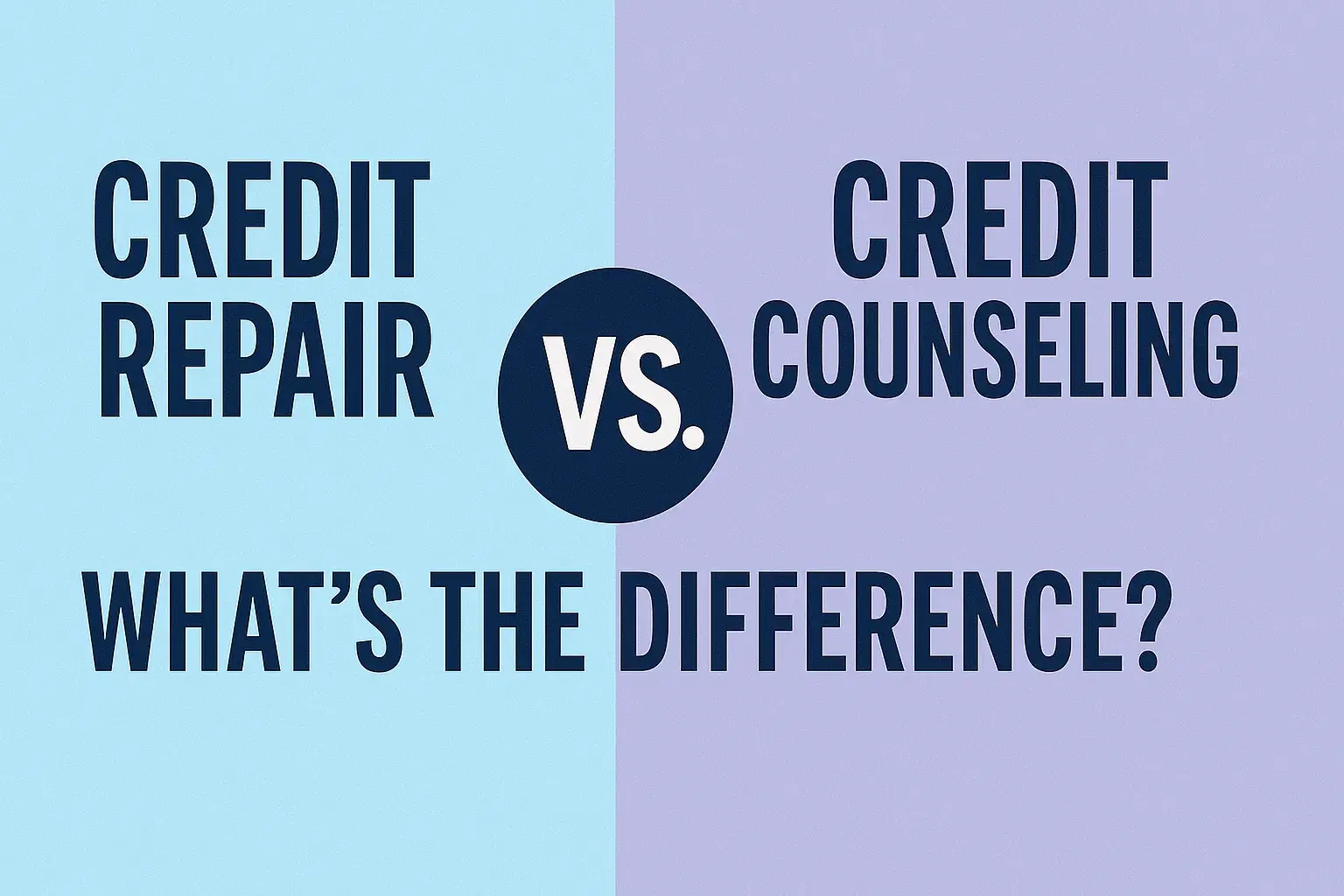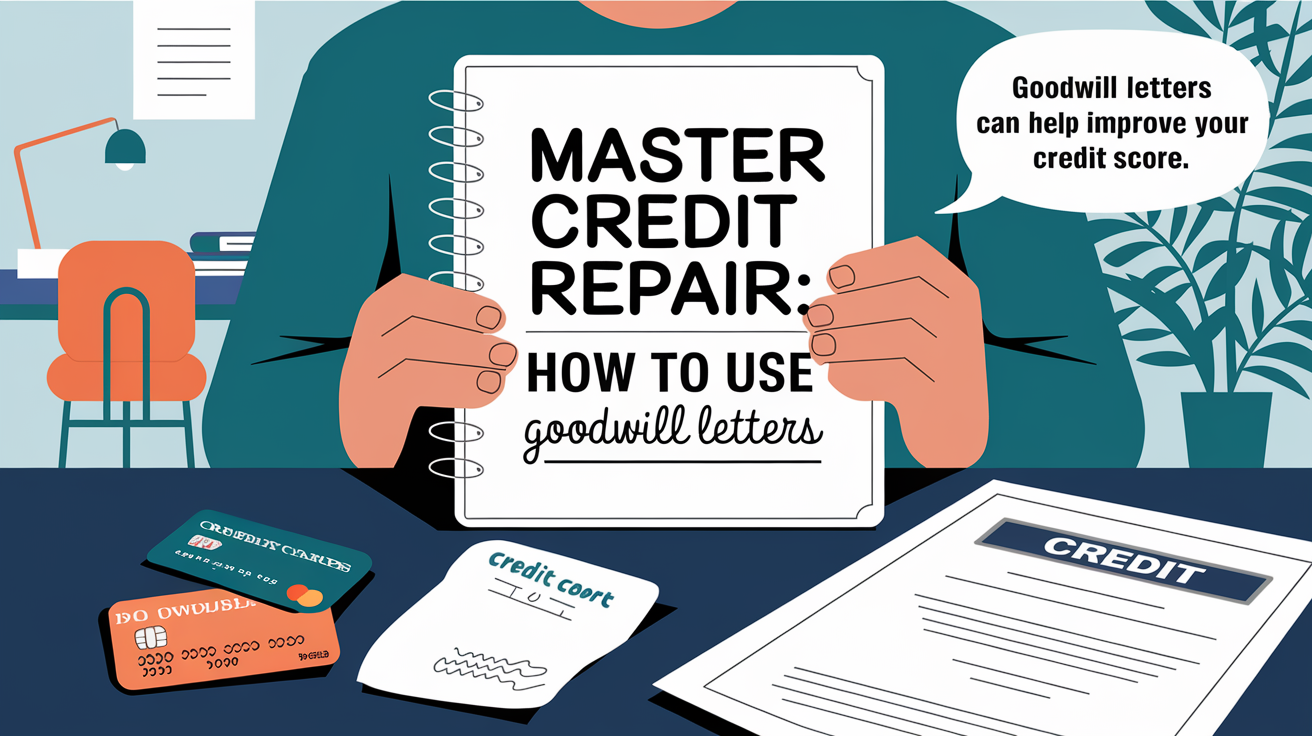Credit Repair vs. Credit Counseling: What’s the Difference?

What Is Credit Repair?
Credit repair is the process of improving your credit score by addressing inaccuracies, errors, or negative items on your credit report. This can involve disputing incorrect information, negotiating with creditors, or taking steps to remove outdated or unverifiable items from your credit file. Credit repair can be done independently or through a professional credit repair company.
How Credit Repair Works
-
Credit Report Review: You or a credit repair service obtains copies of your credit reports from the three major credit bureaus—Equifax, Experian, and TransUnion—and reviews them for errors, such as incorrect account balances, outdated negative items, or accounts that don’t belong to you.
-
Disputing Errors: If inaccuracies are found, disputes are filed with the credit bureaus or creditors to have the errors corrected or removed. This process is governed by the Fair Credit Reporting Act (FCRA), which requires bureaus to investigate disputes within 30-45 days.
-
Negotiating with Creditors: In some cases, credit repair involves negotiating with creditors to settle debts or remove negative items, such as late payments, in exchange for payment (a process called “pay for delete,” though not all creditors agree to this).
-
Monitoring Progress: Credit repair is an ongoing process, as disputes may take time, and new issues may arise. Professional services often monitor your credit and provide updates.
Who Offers Credit Repair?
-
DIY Credit Repair: You can handle credit repair yourself by obtaining free credit reports from AnnualCreditReport.com, identifying errors, and filing disputes directly with the credit bureaus.
-
Credit Repair Companies: These businesses charge fees to manage the dispute process, negotiate with creditors, and provide guidance. Reputable companies comply with the Credit Repair Organizations Act (CROA), which regulates their practices.
What Is Credit Counseling?
Credit counseling is a service provided by nonprofit or for-profit agencies to help individuals manage their finances, create budgets, and address debt. Credit counselors work with you to develop a personalized plan to improve your financial health, often focusing on debt repayment strategies like debt management plans (DMPs).
How Credit Counseling Works
-
Financial Assessment: A certified credit counselor reviews your income, expenses, debts, and financial goals to understand your situation.
-
Budget Planning: The counselor helps you create a realistic budget to manage expenses and allocate funds toward debt repayment.
-
Debt Management Plan (DMP): For those struggling with debt, counselors may negotiate with creditors to lower interest rates or waive fees, consolidating your payments into a single monthly amount managed by the agency.
-
Education and Guidance: Counselors provide education on financial topics, such as budgeting, saving, and avoiding future debt.
-
Ongoing Support: Many agencies offer follow-up sessions to track your progress and adjust your plan as needed.
Who Offers Credit Counseling?
-
Nonprofit Credit Counseling Agencies: Organizations like the National Foundation for Credit Counseling (NFCC) or GreenPath Financial Wellness offer low-cost or free services.
-
For-Profit Agencies: Some for-profit companies provide similar services but may charge higher fees.
Key Differences Between Credit Repair and Credit Counseling
|
Aspect |
Credit Repair |
Credit Counseling |
|---|---|---|
|
Primary Focus |
Fixing errors and improving credit scores |
Managing debt and improving overall financial health |
|
Goal |
Remove inaccuracies from credit reports |
Create a budget and repay debts effectively |
|
Approach |
Disputes and negotiations with credit bureaus/creditors |
Budgeting, DMPs, and financial education |
|
Cost |
Free (DIY) or $50-$150/month (professional services) |
Free or low-cost (nonprofit) or higher (for-profit) |
|
Typical Duration |
3-6 months, depending on disputes |
3-5 years for DMPs, or shorter for counseling |
|
Regulation |
Governed by CROA |
Regulated by state laws and industry standards |
|
Impact on Credit Score |
Can improve score by removing negative items |
May initially lower score (e.g., DMP notations) |
Benefits of Credit Repair
-
Improved Credit Score: Correcting errors, such as inaccurate late payments or accounts, can boost your credit score.
-
Increased Financial Opportunities: A higher credit score can lead to better loan terms, lower interest rates, and easier approval for credit cards or mortgages.
-
Control Over Credit Reports: Credit repair empowers you to ensure your credit reports are accurate and fair.
-
Professional Expertise: Hiring a reputable credit repair company can save time and improve outcomes, especially for complex cases.
-
Consumer Rights Protection: The FCRA gives you the right to dispute inaccuracies, making credit repair a legally supported process.
Benefits of Credit Counseling
-
Debt Reduction: Counselors can negotiate lower interest rates or fees, reducing the total cost of your debt.
-
Simplified Payments: A DMP consolidates multiple debts into one monthly payment, making it easier to manage.
-
Financial Education: Counseling provides tools and knowledge to avoid future financial pitfalls.
-
Nonprofit Options: Many agencies offer free or low-cost services, making credit counseling accessible.
-
Stress Relief: A structured plan and professional support can alleviate the stress of overwhelming debt.
Risks and Limitations of Credit Repair
-
Scams and Unreliable Companies: Some credit repair firms make false promises or charge exorbitant fees without delivering results. Always research companies and ensure they comply with CROA.
-
No Guaranteed Results: Not all disputes are successful, and legitimate negative items (e.g., accurate late payments) cannot be removed.
-
Time-Consuming: The dispute process can take months, and multiple rounds of disputes may be needed.
-
Costs: Professional services can be expensive, with monthly fees ranging from $50 to $150 or more.
-
Temporary Impact: Filing disputes may temporarily affect your credit report as bureaus investigate.
Risks and Limitations of Credit Counseling
-
Impact on Credit Score: Enrolling in a DMP may be noted on your credit report, which some lenders view negatively, though the impact is often temporary.
-
Long Commitment: DMPs typically last 3-5 years, requiring consistent payments and discipline.
-
Limited Scope: Credit counseling focuses on debt and budgeting, not credit score improvement, so it may not address errors on your credit report.
-
Fees: While nonprofit agencies charge minimal fees, for-profit agencies can be costly.
-
Not a Quick Fix: Counseling requires long-term effort and lifestyle changes to achieve lasting results.
When to Choose Credit Repair
Credit repair is ideal if:
-
Your credit report contains errors, such as incorrect account information, outdated negative items, or identity theft-related issues.
-
Your primary goal is to improve your credit score to qualify for better loan terms or credit opportunities.
-
You’re comfortable handling disputes yourself or hiring a reputable credit repair service.
-
You don’t have significant debt but want to address specific credit report issues.
Example Scenario: If you discover an erroneous late payment on your credit report that’s dragging down your score, credit repair can help you dispute it and potentially boost your score.
When to Choose Credit Counseling
Credit counseling is the better choice if:
-
You’re struggling with high levels of unsecured debt, such as credit card balances or personal loans.
-
You need help creating a budget or managing your finances to avoid falling deeper into debt.
-
You want a structured plan, like a DMP, to pay off debts efficiently.
-
You’re seeking education and tools to improve your financial habits long-term.
Example Scenario: If you’re juggling multiple credit card payments with high interest rates and struggling to make ends meet, a credit counselor can help you consolidate payments and create a sustainable budget.
How to Get Started with Either Option
Starting with Credit Repair
-
Obtain Your Credit Reports: Request free reports from Equifax, Experian, and TransUnion via AnnualCreditReport.com.
-
Review for Errors: Look for inaccuracies, such as incorrect balances, duplicate accounts, or outdated negative items (e.g., bankruptcies older than 10 years).
-
File Disputes: Submit disputes online, by mail, or by phone with the credit bureaus. Provide supporting documentation, like payment records.
-
Consider Professional Help: Research reputable credit repair companies with transparent pricing and CROA compliance. Avoid firms promising guaranteed results.
-
Monitor Progress: Check your credit reports regularly to track changes and ensure disputes are resolved.
Starting with Credit Counseling
-
Find a Reputable Agency: Look for nonprofit agencies certified by the NFCC or the Financial Counseling Association of America (FCAA). Check reviews and verify their credentials.
-
Schedule a Consultation: Most agencies offer a free initial session to assess your finances.
-
Provide Financial Information: Share details about your income, expenses, and debts to help the counselor create a plan.
-
Enroll in a DMP (if Needed): If a DMP is recommended, review the terms, including fees and creditor agreements, before enrolling.
-
Follow the Plan: Stick to the budget and payment schedule provided by the counselor, attending follow-up sessions as needed.
Frequently Asked Questions (FAQs):
1. Can credit repair remove accurate negative items from my credit report?
No, credit repair can only address inaccurate or unverifiable items. Legitimate negative items, like missed payments, will remain on your report for 7-10 years, depending on the item.
2. Is credit counseling free?
Nonprofit agencies often offer free or low-cost counseling, with fees for DMPs typically ranging from $0 to $50 per month. For-profit agencies may charge higher fees.
3. How long does credit repair take?
The process typically takes 3-6 months, depending on the number of disputes and the complexity of your credit report. Multiple rounds of disputes may be needed.
4. Will a DMP hurt my credit score?
Enrolling in a DMP may be noted on your credit report, which could temporarily impact your score. However, consistent payments and reduced debt can improve your score over time.
5. Can I do credit repair and credit counseling at the same time?
Yes, you can pursue both if you have credit report errors and significant debt. For example, you could dispute inaccuracies while working with a counselor to manage debt.
6. How do I avoid credit repair scams?
Choose companies that comply with the CROA, avoid upfront fees, and provide clear contracts. Be wary of firms promising guaranteed results or quick fixes.
7. What types of debt can be included in a DMP?
DMPs typically cover unsecured debts, such as credit cards, personal loans, and medical bills. Secured debts, like mortgages or auto loans, are not included.
8. Can credit counseling help with student loans?
Some agencies offer guidance on student loan repayment options, but DMPs typically don’t include student loans. Consult your counselor for specific advice.
Conclusion
Choosing between credit repair and credit counseling depends on your financial situation and goals. If your credit score is suffering due to errors or inaccuracies on your credit report, credit repair can help you correct those issues and improve your score. On the other hand, if you’re overwhelmed by debt or struggling to manage your finances, credit counseling offers a structured path to debt repayment and financial stability. Both options have their strengths and limitations, so it’s essential to assess your needs, research reputable providers, and take proactive steps to improve your financial health.
By understanding the differences between credit repair and credit counseling, you can make an informed decision that aligns with your goals. Whether you choose to dispute errors on your credit report or work with a counselor to create a budget, taking action today can set you on the path to a stronger financial future.
Related Stories
Recent Posts
Inaccurate Account Balances on Your Credit Report: Causes, Risks, and How to Fix Them
How Long Do Hard Inquiries Stay on Your Credit Report?
Does ZIP Code Affect Your Credit Score? Facts vs Myths Explained
How to Choose a Credit Repair Company in 2026
Does Closing a Checking Account Affect Your Credit Score? Here’s the Truth


